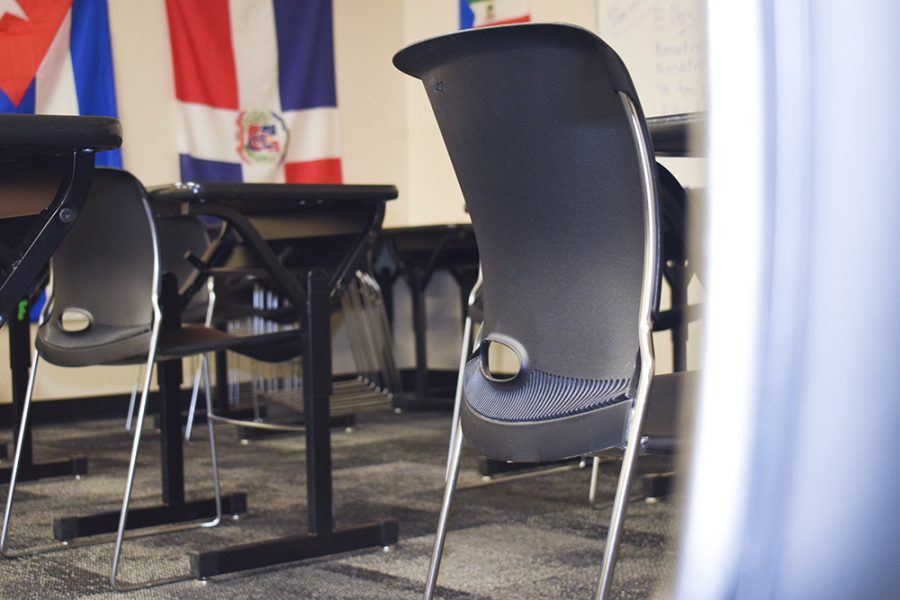Summer School is Cool: Summer school’s reputation is changing
Classrooms stay empty during the summer but learning still continues. Majority of summer classes are completed online.
May 24, 2021
The dreaded summer school, wasting your vacation away sitting in a toasty classroom where all of the information goes in one ear and out the other. This is what most students think of when you say you have summer school, but in reality, it is not like that at all.
Summer school at NHS is much more than the stereotypical stuck in a classroom all summer type of summer school. There are numerous options of classes for students to choose from, allowing students to either make up a class or pick up some credits ahead of time, so they wouldn’t have to take it during the regular school year. The summer semester’s popularity has grown over time as students have begun to learn of the benefits of taking a summer school class.
“Last year we had over 1500 students taking over 2000 courses. Some students took a class each session,” NHS principal Dr. Craig McCaffery said. “We are still doing enrollments for this summer, but to date, we are around 1,300 students. I expect the number to go up as we approach the deadline.”
The high number of students taking a summer school class might seem surprising, but the school has many options, allowing students to take a variety of classes that appeal to them.
“We teach 29 total courses over both sessions of summer school,” McCaffery said.
Students who take summer school classes have different reasons why they are attending these classes during the summer rather than during the fall or spring, but taking these courses can help improve a grade or help them free up a class. Kelsee Keitel, NHS’s Director of School Counseling, says summer classes are a great way for students to earn back failed credits or get a head start on them.
“For some students summer school is a great way to get caught up and improve academic standing. For example, if you have failed any core classes. For other students, summer school gives them the opportunity to work ahead and prepare to graduate early,” Keitel said.
Taking a summer school class is more complicated than just signing up for a class, says Keitel, as there are many things counselors and principals look at before putting a student in the summer school program.
“We usually limit how many classes a student can take per session, and this approval is determined by things such as: historical academic performance, GPA, attendance, other summer commitments, and other relevant information (like if a student is planning to graduate a year early),” Keitel said.
Many teachers enjoy summer school, as it allows students to help themselves academically in many ways.
“From helping those who are behind, to propelling others a little fast forward, summer school is a great opportunity to work towards your academic goals. Summer school often helps students who need a little structure in their summers as well,” Keitel said.
But teachers are not the only ones who like summer school, as students are often keen on taking summer courses as well. Lots of students say taking a summer school class helped them move forward with their grades.
“It can knock a credit out of the way so you don’t have to do it and definitely take economics over the summer,” NHS senior Joseph York said. “You don’t have to worry about that class during the school year.”
Students all have many different reasons for taking these classes over the summer, as some decided to retake classes to help them with classes they took during the COVID outbreak.
“I took this class during the summer because I thought it would benefit me to learn the material twice so that I could better understand it,” NHS sophomore Marin Nelson said. Nelson retook a semester of Algebra 1.
Many students have also enjoyed the workload, as there is more freedom with their classes than they would have during the traditional school year. The classes have deadlines for each of their assignments, but students often work ahead, allowing themselves to enjoy their summer.
“There was little workload. On class days you did three activities and on non class days you did online learning about your body. I would say there was less work than a regular class,” NHS sophomore Phillip Nguyen said. Nguyen took a semester of summer gym before his freshman year.
Teachers have also said that the workload is much different, as they have to fit a whole semester class into a period of a few weeks. U.S. History teacher Brandon Swart explains how course work is compacted, but flaws still lie with this system.
“The material is the same, just condensed. The issue we have with the summer U.S. history courses is that if a student wants to take the full year, they need to do it concurrently,” Swart said. “They would need to take both semester 1 and semester 2 at the same time over the summer and that is not an easy task.”
While the workload may seem like it’s more than usual to teachers, students find it much easier than an actual class. Students often like how teachers are not always there, and they can work at their own pace.
“You can self pace the class and finish when you would like to, the teachers are just there to reinforce,” Nelson said.
The ways you learn is also very similar to how you learn in school, with iPads being used most of the time for learning the materials and turning in assignments.
“It used to be very different but I think since we implemented Canvas and iPads there are more similarities now than in previous years,” Swart said. “Everything has to be loaded and set up in Canvas so students have one central location to obtain all materials.
With all the material in one place for students to access and teach themselves, students are given the tools they need to learn without being in a classroom all day, says Swart. Teachers have noted how some students struggle in this form of learning, while others flourish. Freshman Hope Wickstrom has some advice about what to expect during a week of summer gym.
“It was just a video you had to watch and a quiz that was over the video. It was about 5 questions per quiz. Lastly, we had to fill out a weekly log of activities we did. We had to do at least 12 hours of fitness per week and record our beginning and end heart rate,” Wickstrom said.
Over the years, NHS principal Dr. McCaffrey has watched the summer school program grow over the years. He says it started as a small program with few students taking a semester class, but over time has become a program many students use.
“From there it grew and grew to what it is today. As the current principal, I am thrilled with all of the summer options we have,” McCaffery said.





